The Travel and Tourism Business Toolkit: Revenue and HR Management
VerifiedAdded on 2023/02/02
|22
|6036
|79
Report
AI Summary
This report provides a comprehensive analysis of revenue management principles and their application within the travel and tourism industry, specifically using TopDeck as a case study. It explores pricing strategies, demand forecasting, and the impact of inventory availability on revenue generation. Furthermore, the report delves into the stages of the HR lifecycle, emphasizing the importance of recruitment, selection, training, and development in retaining and developing talent within the organization. It also examines relevant legislation governing the travel and tourism sector, including company, employment, and contract law, and their influence on business decision-making. The report also covers financial reporting mechanisms, including different types of financial statements and the significance of budgeting and variance analysis for effective financial management. The report aims to provide a holistic understanding of the key aspects of business operations in the travel and tourism industry, offering insights into revenue optimization, human resource management, legal compliance, and financial planning.
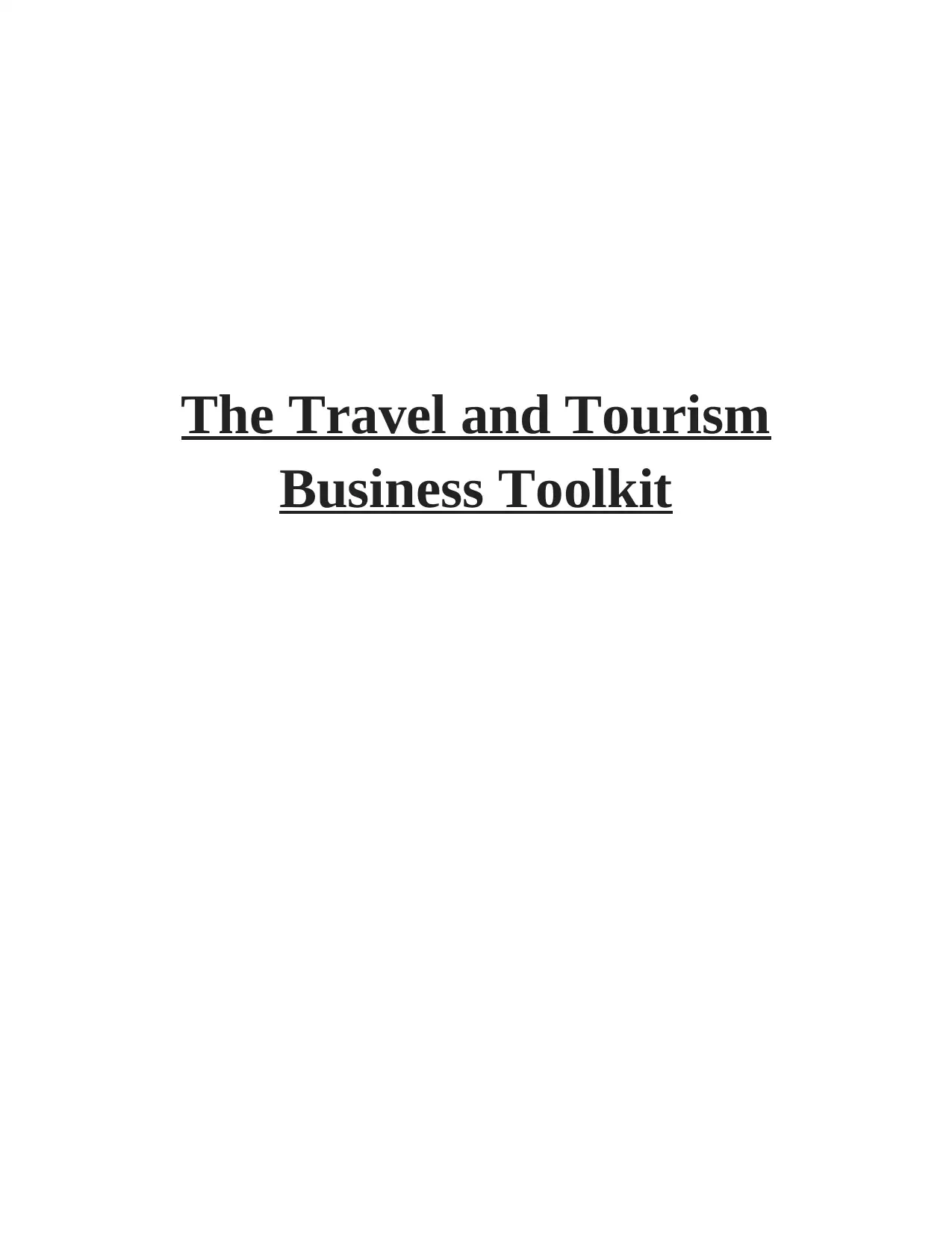
The Travel and Tourism
Business Toolkit
Business Toolkit
Paraphrase This Document
Need a fresh take? Get an instant paraphrase of this document with our AI Paraphraser
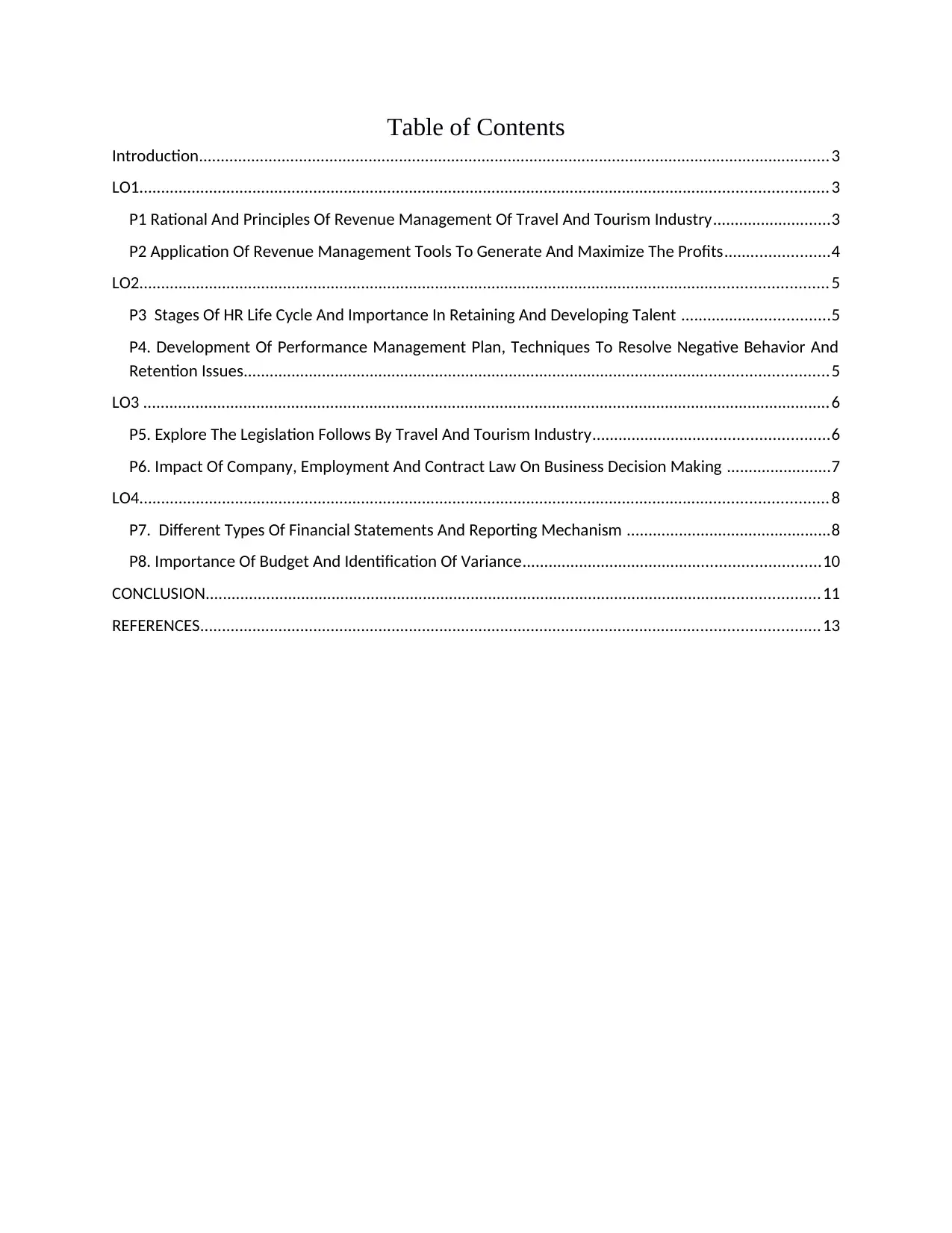
Table of Contents
Introduction.................................................................................................................................................3
LO1..............................................................................................................................................................3
P1 Rational And Principles Of Revenue Management Of Travel And Tourism Industry...........................3
P2 Application Of Revenue Management Tools To Generate And Maximize The Profits........................4
LO2..............................................................................................................................................................5
P3 Stages Of HR Life Cycle And Importance In Retaining And Developing Talent ..................................5
P4. Development Of Performance Management Plan, Techniques To Resolve Negative Behavior And
Retention Issues......................................................................................................................................5
LO3 ..............................................................................................................................................................6
P5. Explore The Legislation Follows By Travel And Tourism Industry......................................................6
P6. Impact Of Company, Employment And Contract Law On Business Decision Making ........................7
LO4..............................................................................................................................................................8
P7. Different Types Of Financial Statements And Reporting Mechanism ...............................................8
P8. Importance Of Budget And Identification Of Variance....................................................................10
CONCLUSION.............................................................................................................................................11
REFERENCES..............................................................................................................................................13
Introduction.................................................................................................................................................3
LO1..............................................................................................................................................................3
P1 Rational And Principles Of Revenue Management Of Travel And Tourism Industry...........................3
P2 Application Of Revenue Management Tools To Generate And Maximize The Profits........................4
LO2..............................................................................................................................................................5
P3 Stages Of HR Life Cycle And Importance In Retaining And Developing Talent ..................................5
P4. Development Of Performance Management Plan, Techniques To Resolve Negative Behavior And
Retention Issues......................................................................................................................................5
LO3 ..............................................................................................................................................................6
P5. Explore The Legislation Follows By Travel And Tourism Industry......................................................6
P6. Impact Of Company, Employment And Contract Law On Business Decision Making ........................7
LO4..............................................................................................................................................................8
P7. Different Types Of Financial Statements And Reporting Mechanism ...............................................8
P8. Importance Of Budget And Identification Of Variance....................................................................10
CONCLUSION.............................................................................................................................................11
REFERENCES..............................................................................................................................................13
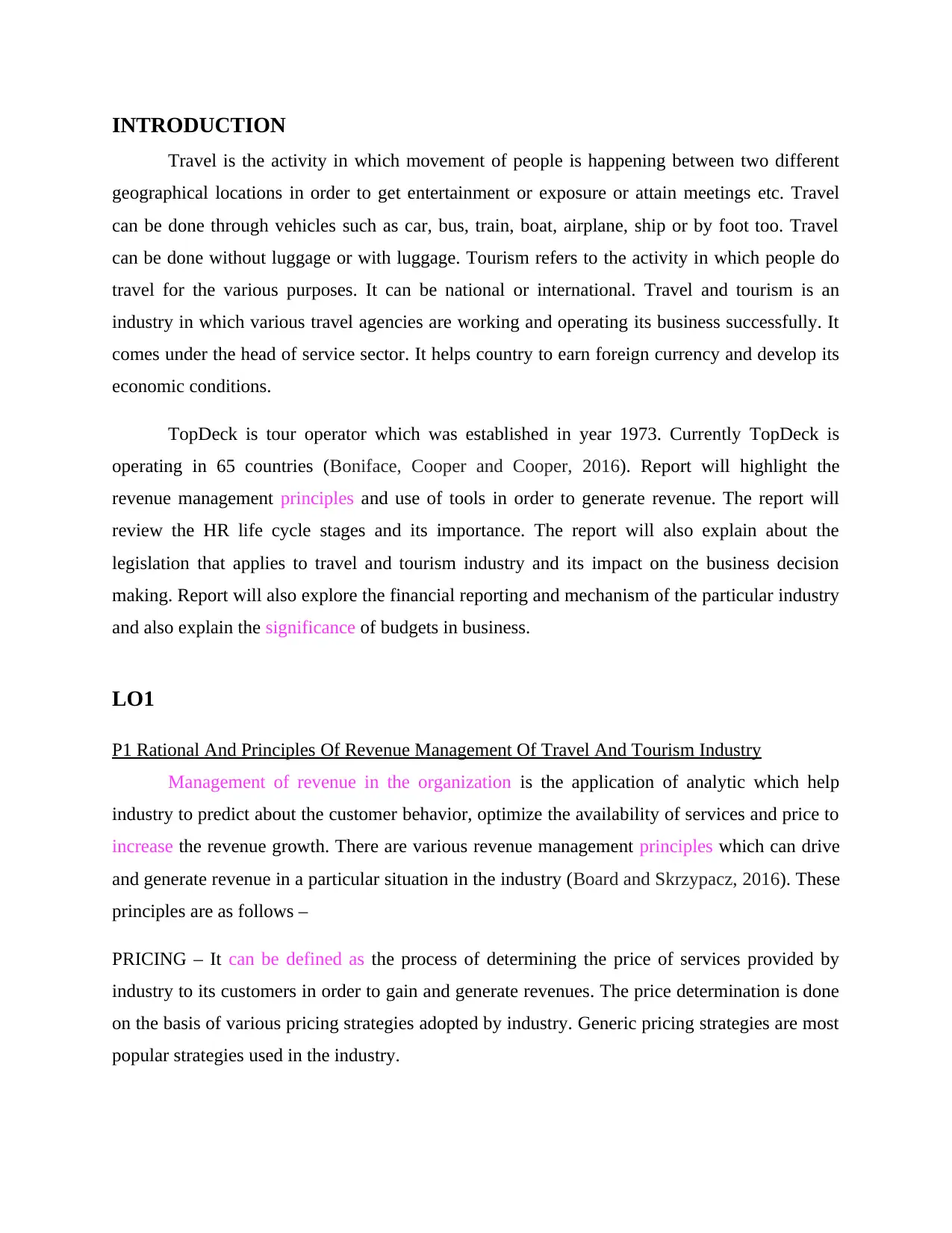
INTRODUCTION
Travel is the activity in which movement of people is happening between two different
geographical locations in order to get entertainment or exposure or attain meetings etc. Travel
can be done through vehicles such as car, bus, train, boat, airplane, ship or by foot too. Travel
can be done without luggage or with luggage. Tourism refers to the activity in which people do
travel for the various purposes. It can be national or international. Travel and tourism is an
industry in which various travel agencies are working and operating its business successfully. It
comes under the head of service sector. It helps country to earn foreign currency and develop its
economic conditions.
TopDeck is tour operator which was established in year 1973. Currently TopDeck is
operating in 65 countries (Boniface, Cooper and Cooper, 2016). Report will highlight the
revenue management principles and use of tools in order to generate revenue. The report will
review the HR life cycle stages and its importance. The report will also explain about the
legislation that applies to travel and tourism industry and its impact on the business decision
making. Report will also explore the financial reporting and mechanism of the particular industry
and also explain the significance of budgets in business.
LO1
P1 Rational And Principles Of Revenue Management Of Travel And Tourism Industry
Management of revenue in the organization is the application of analytic which help
industry to predict about the customer behavior, optimize the availability of services and price to
increase the revenue growth. There are various revenue management principles which can drive
and generate revenue in a particular situation in the industry (Board and Skrzypacz, 2016). These
principles are as follows –
PRICING – It can be defined as the process of determining the price of services provided by
industry to its customers in order to gain and generate revenues. The price determination is done
on the basis of various pricing strategies adopted by industry. Generic pricing strategies are most
popular strategies used in the industry.
Travel is the activity in which movement of people is happening between two different
geographical locations in order to get entertainment or exposure or attain meetings etc. Travel
can be done through vehicles such as car, bus, train, boat, airplane, ship or by foot too. Travel
can be done without luggage or with luggage. Tourism refers to the activity in which people do
travel for the various purposes. It can be national or international. Travel and tourism is an
industry in which various travel agencies are working and operating its business successfully. It
comes under the head of service sector. It helps country to earn foreign currency and develop its
economic conditions.
TopDeck is tour operator which was established in year 1973. Currently TopDeck is
operating in 65 countries (Boniface, Cooper and Cooper, 2016). Report will highlight the
revenue management principles and use of tools in order to generate revenue. The report will
review the HR life cycle stages and its importance. The report will also explain about the
legislation that applies to travel and tourism industry and its impact on the business decision
making. Report will also explore the financial reporting and mechanism of the particular industry
and also explain the significance of budgets in business.
LO1
P1 Rational And Principles Of Revenue Management Of Travel And Tourism Industry
Management of revenue in the organization is the application of analytic which help
industry to predict about the customer behavior, optimize the availability of services and price to
increase the revenue growth. There are various revenue management principles which can drive
and generate revenue in a particular situation in the industry (Board and Skrzypacz, 2016). These
principles are as follows –
PRICING – It can be defined as the process of determining the price of services provided by
industry to its customers in order to gain and generate revenues. The price determination is done
on the basis of various pricing strategies adopted by industry. Generic pricing strategies are most
popular strategies used in the industry.
⊘ This is a preview!⊘
Do you want full access?
Subscribe today to unlock all pages.

Trusted by 1+ million students worldwide
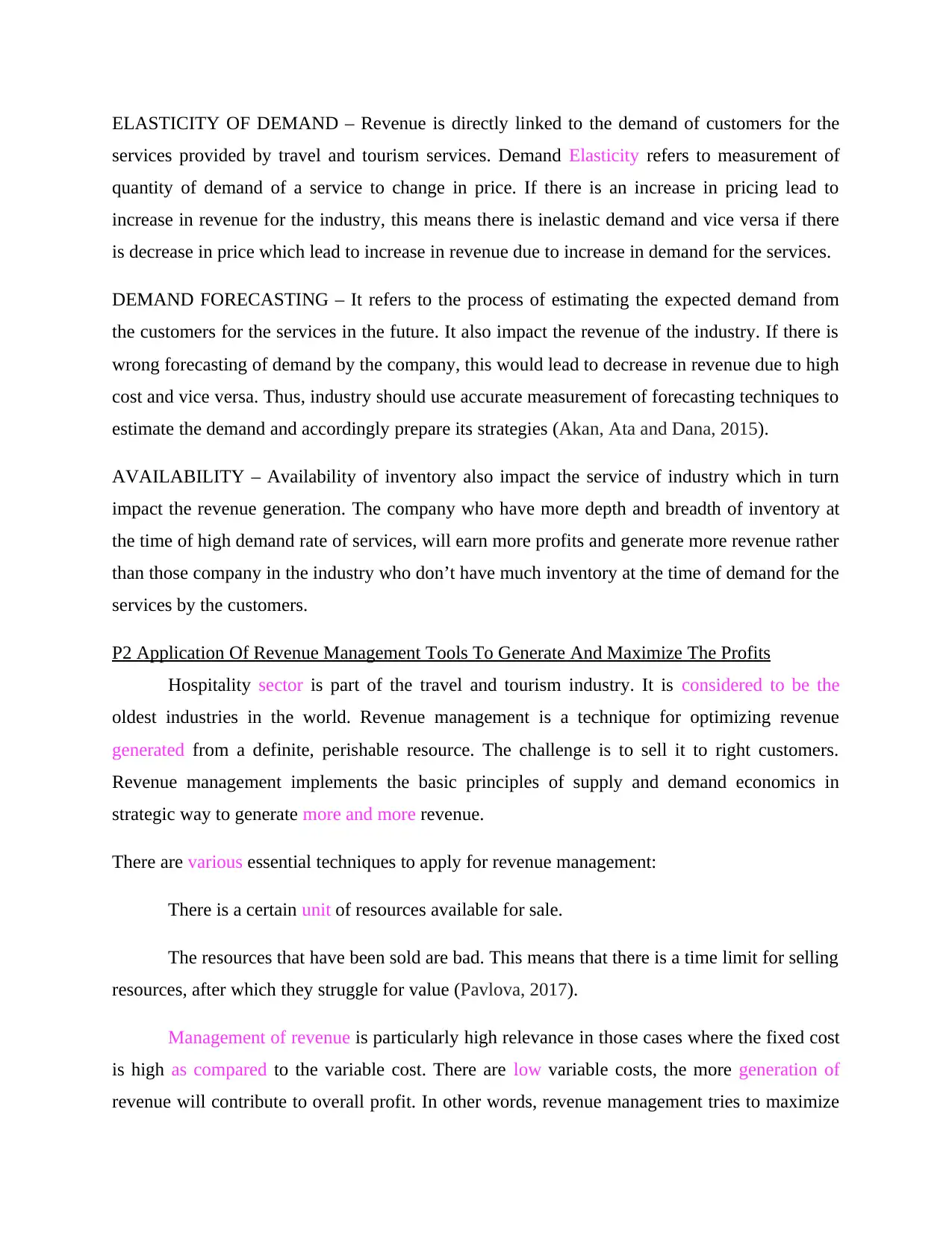
ELASTICITY OF DEMAND – Revenue is directly linked to the demand of customers for the
services provided by travel and tourism services. Demand Elasticity refers to measurement of
quantity of demand of a service to change in price. If there is an increase in pricing lead to
increase in revenue for the industry, this means there is inelastic demand and vice versa if there
is decrease in price which lead to increase in revenue due to increase in demand for the services.
DEMAND FORECASTING – It refers to the process of estimating the expected demand from
the customers for the services in the future. It also impact the revenue of the industry. If there is
wrong forecasting of demand by the company, this would lead to decrease in revenue due to high
cost and vice versa. Thus, industry should use accurate measurement of forecasting techniques to
estimate the demand and accordingly prepare its strategies (Akan, Ata and Dana, 2015).
AVAILABILITY – Availability of inventory also impact the service of industry which in turn
impact the revenue generation. The company who have more depth and breadth of inventory at
the time of high demand rate of services, will earn more profits and generate more revenue rather
than those company in the industry who don’t have much inventory at the time of demand for the
services by the customers.
P2 Application Of Revenue Management Tools To Generate And Maximize The Profits
Hospitality sector is part of the travel and tourism industry. It is considered to be the
oldest industries in the world. Revenue management is a technique for optimizing revenue
generated from a definite, perishable resource. The challenge is to sell it to right customers.
Revenue management implements the basic principles of supply and demand economics in
strategic way to generate more and more revenue.
There are various essential techniques to apply for revenue management:
There is a certain unit of resources available for sale.
The resources that have been sold are bad. This means that there is a time limit for selling
resources, after which they struggle for value (Pavlova, 2017).
Management of revenue is particularly high relevance in those cases where the fixed cost
is high as compared to the variable cost. There are low variable costs, the more generation of
revenue will contribute to overall profit. In other words, revenue management tries to maximize
services provided by travel and tourism services. Demand Elasticity refers to measurement of
quantity of demand of a service to change in price. If there is an increase in pricing lead to
increase in revenue for the industry, this means there is inelastic demand and vice versa if there
is decrease in price which lead to increase in revenue due to increase in demand for the services.
DEMAND FORECASTING – It refers to the process of estimating the expected demand from
the customers for the services in the future. It also impact the revenue of the industry. If there is
wrong forecasting of demand by the company, this would lead to decrease in revenue due to high
cost and vice versa. Thus, industry should use accurate measurement of forecasting techniques to
estimate the demand and accordingly prepare its strategies (Akan, Ata and Dana, 2015).
AVAILABILITY – Availability of inventory also impact the service of industry which in turn
impact the revenue generation. The company who have more depth and breadth of inventory at
the time of high demand rate of services, will earn more profits and generate more revenue rather
than those company in the industry who don’t have much inventory at the time of demand for the
services by the customers.
P2 Application Of Revenue Management Tools To Generate And Maximize The Profits
Hospitality sector is part of the travel and tourism industry. It is considered to be the
oldest industries in the world. Revenue management is a technique for optimizing revenue
generated from a definite, perishable resource. The challenge is to sell it to right customers.
Revenue management implements the basic principles of supply and demand economics in
strategic way to generate more and more revenue.
There are various essential techniques to apply for revenue management:
There is a certain unit of resources available for sale.
The resources that have been sold are bad. This means that there is a time limit for selling
resources, after which they struggle for value (Pavlova, 2017).
Management of revenue is particularly high relevance in those cases where the fixed cost
is high as compared to the variable cost. There are low variable costs, the more generation of
revenue will contribute to overall profit. In other words, revenue management tries to maximize
Paraphrase This Document
Need a fresh take? Get an instant paraphrase of this document with our AI Paraphraser
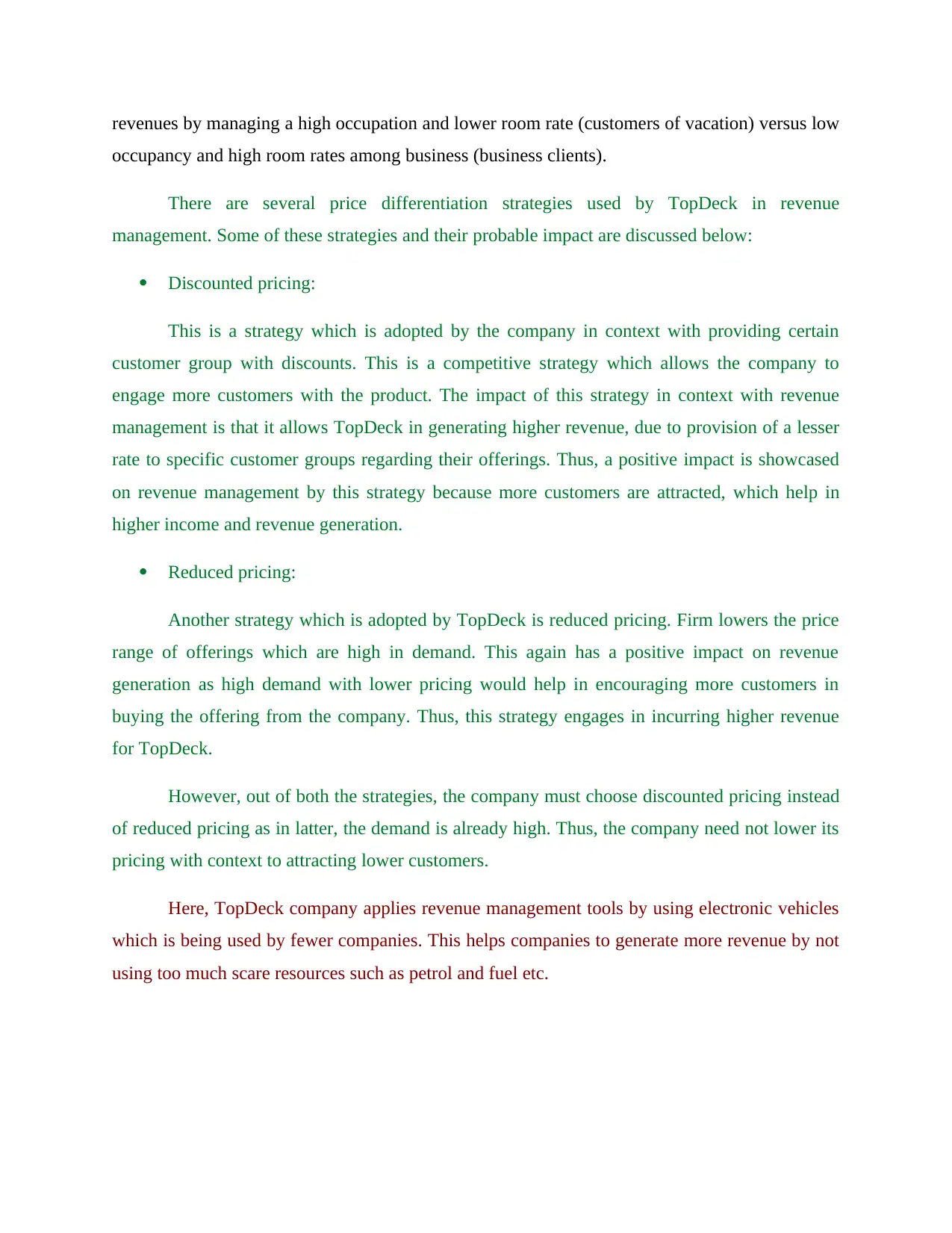
revenues by managing a high occupation and lower room rate (customers of vacation) versus low
occupancy and high room rates among business (business clients).
There are several price differentiation strategies used by TopDeck in revenue
management. Some of these strategies and their probable impact are discussed below:
Discounted pricing:
This is a strategy which is adopted by the company in context with providing certain
customer group with discounts. This is a competitive strategy which allows the company to
engage more customers with the product. The impact of this strategy in context with revenue
management is that it allows TopDeck in generating higher revenue, due to provision of a lesser
rate to specific customer groups regarding their offerings. Thus, a positive impact is showcased
on revenue management by this strategy because more customers are attracted, which help in
higher income and revenue generation.
Reduced pricing:
Another strategy which is adopted by TopDeck is reduced pricing. Firm lowers the price
range of offerings which are high in demand. This again has a positive impact on revenue
generation as high demand with lower pricing would help in encouraging more customers in
buying the offering from the company. Thus, this strategy engages in incurring higher revenue
for TopDeck.
However, out of both the strategies, the company must choose discounted pricing instead
of reduced pricing as in latter, the demand is already high. Thus, the company need not lower its
pricing with context to attracting lower customers.
Here, TopDeck company applies revenue management tools by using electronic vehicles
which is being used by fewer companies. This helps companies to generate more revenue by not
using too much scare resources such as petrol and fuel etc.
occupancy and high room rates among business (business clients).
There are several price differentiation strategies used by TopDeck in revenue
management. Some of these strategies and their probable impact are discussed below:
Discounted pricing:
This is a strategy which is adopted by the company in context with providing certain
customer group with discounts. This is a competitive strategy which allows the company to
engage more customers with the product. The impact of this strategy in context with revenue
management is that it allows TopDeck in generating higher revenue, due to provision of a lesser
rate to specific customer groups regarding their offerings. Thus, a positive impact is showcased
on revenue management by this strategy because more customers are attracted, which help in
higher income and revenue generation.
Reduced pricing:
Another strategy which is adopted by TopDeck is reduced pricing. Firm lowers the price
range of offerings which are high in demand. This again has a positive impact on revenue
generation as high demand with lower pricing would help in encouraging more customers in
buying the offering from the company. Thus, this strategy engages in incurring higher revenue
for TopDeck.
However, out of both the strategies, the company must choose discounted pricing instead
of reduced pricing as in latter, the demand is already high. Thus, the company need not lower its
pricing with context to attracting lower customers.
Here, TopDeck company applies revenue management tools by using electronic vehicles
which is being used by fewer companies. This helps companies to generate more revenue by not
using too much scare resources such as petrol and fuel etc.
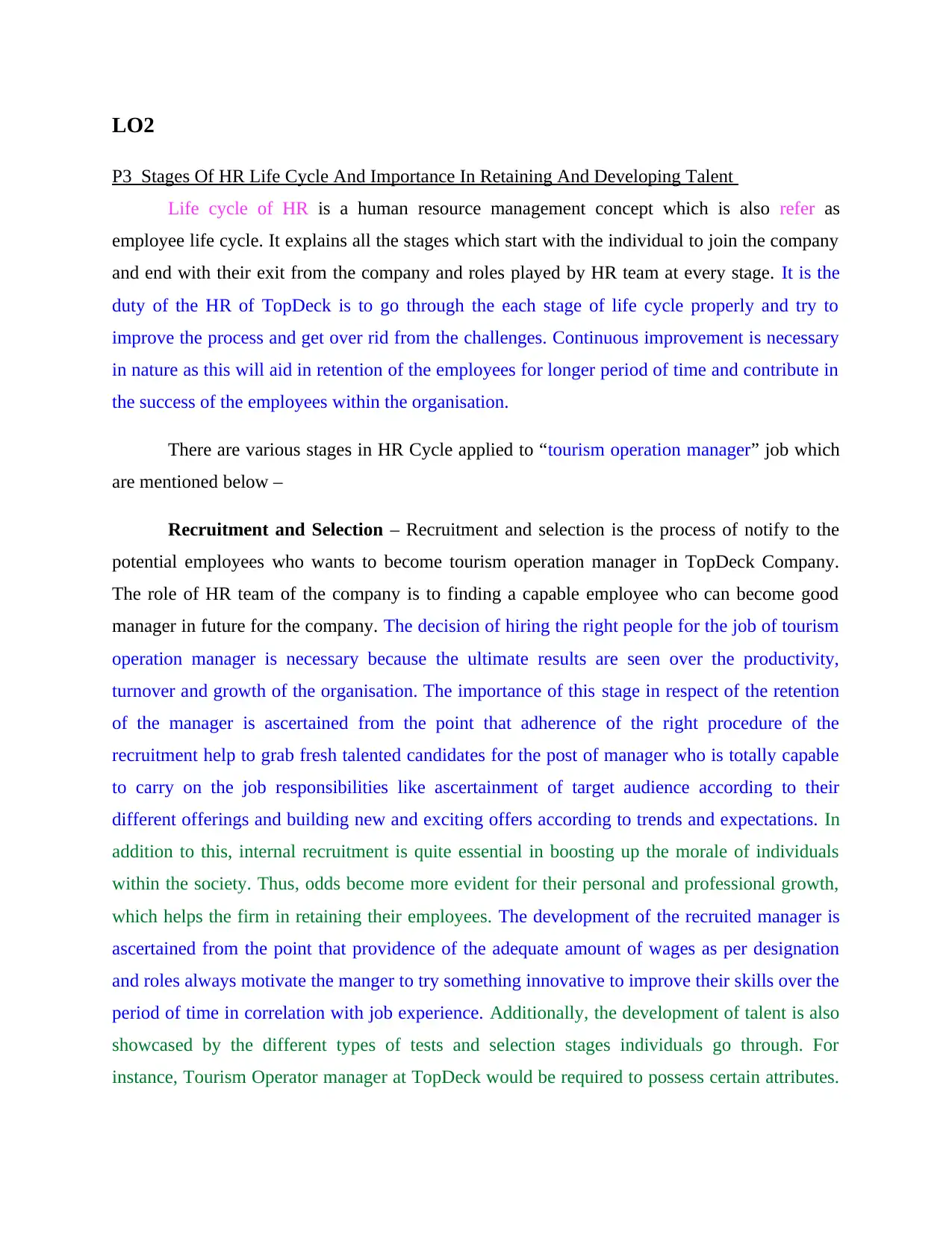
LO2
P3 Stages Of HR Life Cycle And Importance In Retaining And Developing Talent
Life cycle of HR is a human resource management concept which is also refer as
employee life cycle. It explains all the stages which start with the individual to join the company
and end with their exit from the company and roles played by HR team at every stage. It is the
duty of the HR of TopDeck is to go through the each stage of life cycle properly and try to
improve the process and get over rid from the challenges. Continuous improvement is necessary
in nature as this will aid in retention of the employees for longer period of time and contribute in
the success of the employees within the organisation.
There are various stages in HR Cycle applied to “tourism operation manager” job which
are mentioned below –
Recruitment and Selection – Recruitment and selection is the process of notify to the
potential employees who wants to become tourism operation manager in TopDeck Company.
The role of HR team of the company is to finding a capable employee who can become good
manager in future for the company. The decision of hiring the right people for the job of tourism
operation manager is necessary because the ultimate results are seen over the productivity,
turnover and growth of the organisation. The importance of this stage in respect of the retention
of the manager is ascertained from the point that adherence of the right procedure of the
recruitment help to grab fresh talented candidates for the post of manager who is totally capable
to carry on the job responsibilities like ascertainment of target audience according to their
different offerings and building new and exciting offers according to trends and expectations. In
addition to this, internal recruitment is quite essential in boosting up the morale of individuals
within the society. Thus, odds become more evident for their personal and professional growth,
which helps the firm in retaining their employees. The development of the recruited manager is
ascertained from the point that providence of the adequate amount of wages as per designation
and roles always motivate the manger to try something innovative to improve their skills over the
period of time in correlation with job experience. Additionally, the development of talent is also
showcased by the different types of tests and selection stages individuals go through. For
instance, Tourism Operator manager at TopDeck would be required to possess certain attributes.
P3 Stages Of HR Life Cycle And Importance In Retaining And Developing Talent
Life cycle of HR is a human resource management concept which is also refer as
employee life cycle. It explains all the stages which start with the individual to join the company
and end with their exit from the company and roles played by HR team at every stage. It is the
duty of the HR of TopDeck is to go through the each stage of life cycle properly and try to
improve the process and get over rid from the challenges. Continuous improvement is necessary
in nature as this will aid in retention of the employees for longer period of time and contribute in
the success of the employees within the organisation.
There are various stages in HR Cycle applied to “tourism operation manager” job which
are mentioned below –
Recruitment and Selection – Recruitment and selection is the process of notify to the
potential employees who wants to become tourism operation manager in TopDeck Company.
The role of HR team of the company is to finding a capable employee who can become good
manager in future for the company. The decision of hiring the right people for the job of tourism
operation manager is necessary because the ultimate results are seen over the productivity,
turnover and growth of the organisation. The importance of this stage in respect of the retention
of the manager is ascertained from the point that adherence of the right procedure of the
recruitment help to grab fresh talented candidates for the post of manager who is totally capable
to carry on the job responsibilities like ascertainment of target audience according to their
different offerings and building new and exciting offers according to trends and expectations. In
addition to this, internal recruitment is quite essential in boosting up the morale of individuals
within the society. Thus, odds become more evident for their personal and professional growth,
which helps the firm in retaining their employees. The development of the recruited manager is
ascertained from the point that providence of the adequate amount of wages as per designation
and roles always motivate the manger to try something innovative to improve their skills over the
period of time in correlation with job experience. Additionally, the development of talent is also
showcased by the different types of tests and selection stages individuals go through. For
instance, Tourism Operator manager at TopDeck would be required to possess certain attributes.
⊘ This is a preview!⊘
Do you want full access?
Subscribe today to unlock all pages.

Trusted by 1+ million students worldwide
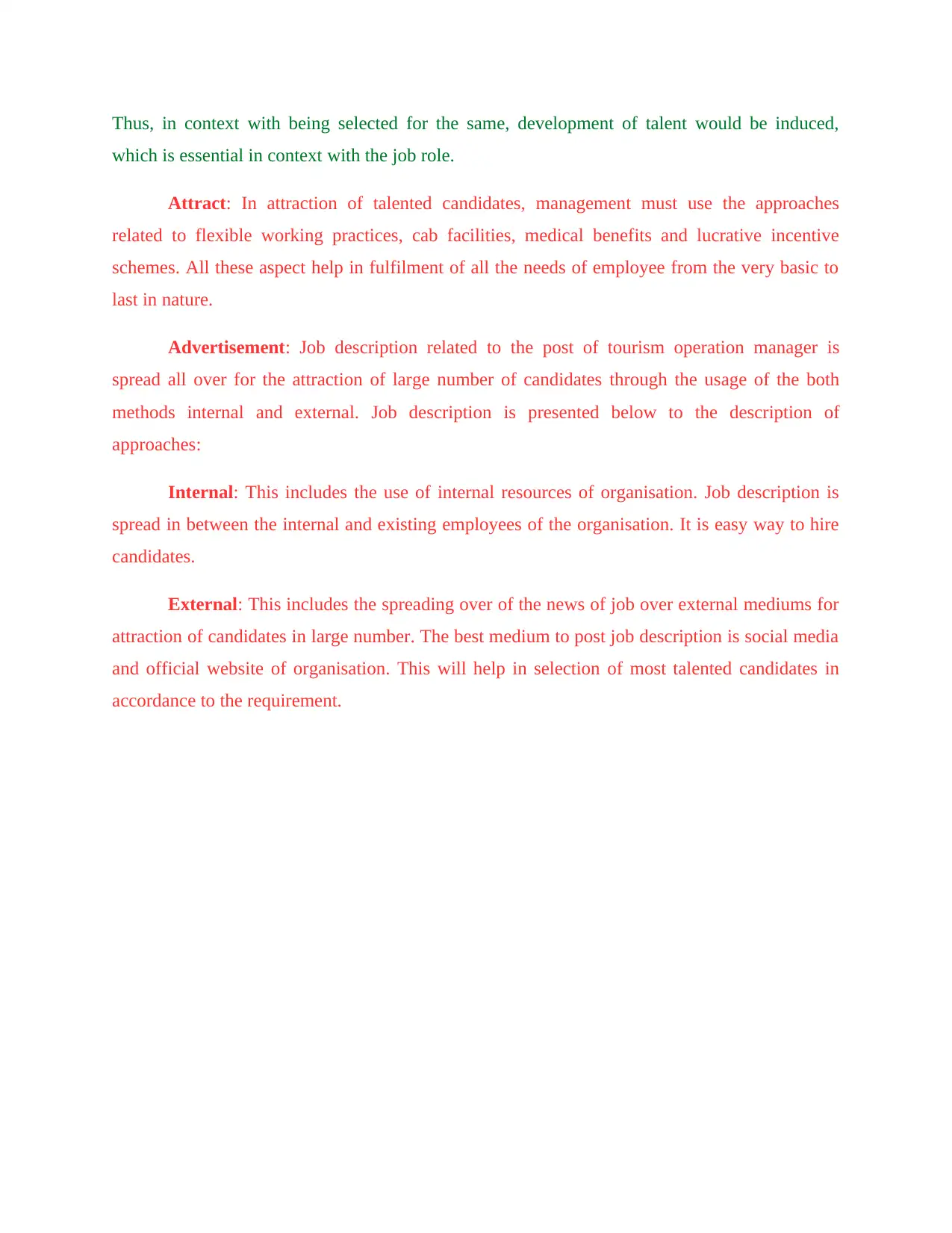
Thus, in context with being selected for the same, development of talent would be induced,
which is essential in context with the job role.
Attract: In attraction of talented candidates, management must use the approaches
related to flexible working practices, cab facilities, medical benefits and lucrative incentive
schemes. All these aspect help in fulfilment of all the needs of employee from the very basic to
last in nature.
Advertisement: Job description related to the post of tourism operation manager is
spread all over for the attraction of large number of candidates through the usage of the both
methods internal and external. Job description is presented below to the description of
approaches:
Internal: This includes the use of internal resources of organisation. Job description is
spread in between the internal and existing employees of the organisation. It is easy way to hire
candidates.
External: This includes the spreading over of the news of job over external mediums for
attraction of candidates in large number. The best medium to post job description is social media
and official website of organisation. This will help in selection of most talented candidates in
accordance to the requirement.
which is essential in context with the job role.
Attract: In attraction of talented candidates, management must use the approaches
related to flexible working practices, cab facilities, medical benefits and lucrative incentive
schemes. All these aspect help in fulfilment of all the needs of employee from the very basic to
last in nature.
Advertisement: Job description related to the post of tourism operation manager is
spread all over for the attraction of large number of candidates through the usage of the both
methods internal and external. Job description is presented below to the description of
approaches:
Internal: This includes the use of internal resources of organisation. Job description is
spread in between the internal and existing employees of the organisation. It is easy way to hire
candidates.
External: This includes the spreading over of the news of job over external mediums for
attraction of candidates in large number. The best medium to post job description is social media
and official website of organisation. This will help in selection of most talented candidates in
accordance to the requirement.
Paraphrase This Document
Need a fresh take? Get an instant paraphrase of this document with our AI Paraphraser
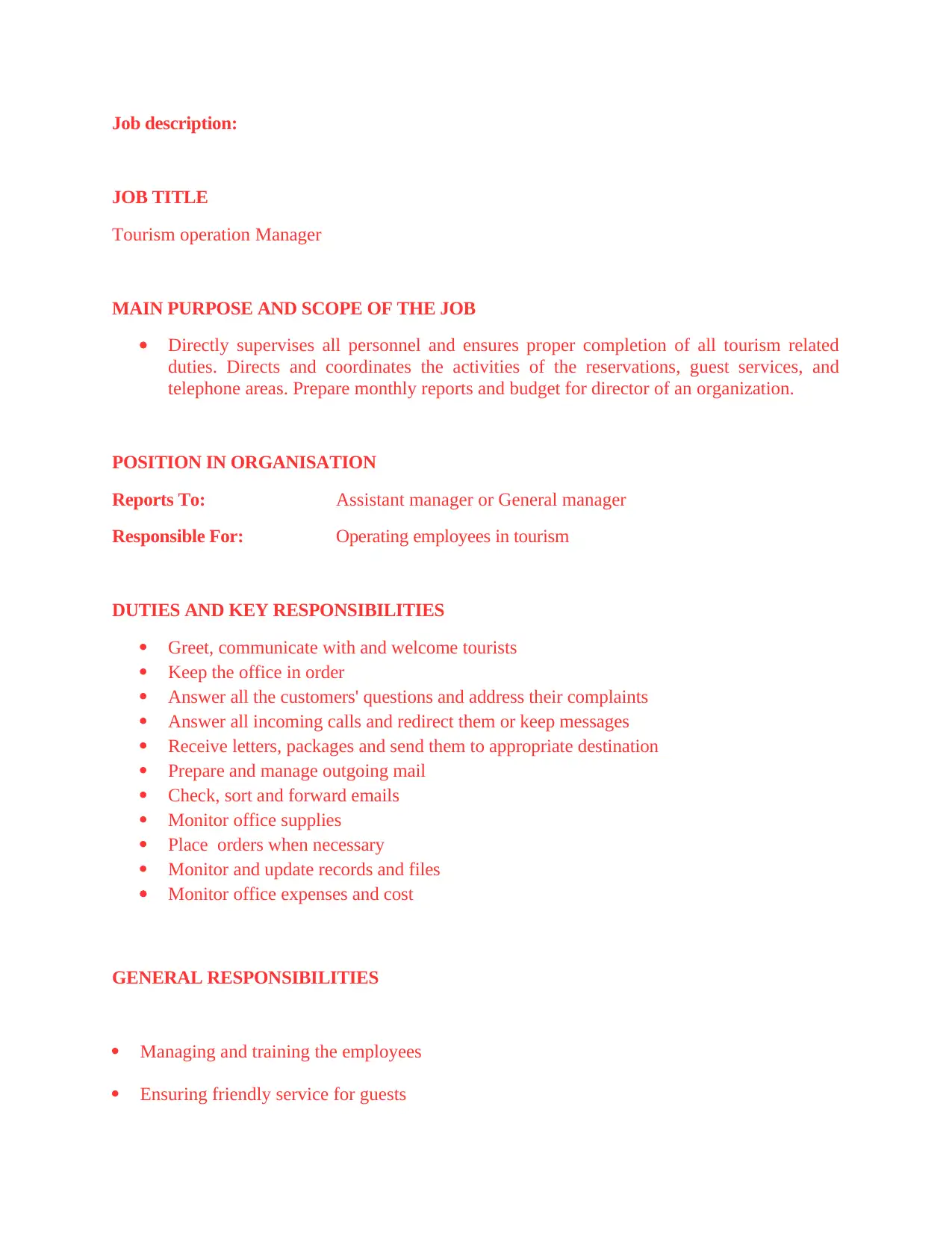
Job description:
JOB TITLE
Tourism operation Manager
MAIN PURPOSE AND SCOPE OF THE JOB
Directly supervises all personnel and ensures proper completion of all tourism related
duties. Directs and coordinates the activities of the reservations, guest services, and
telephone areas. Prepare monthly reports and budget for director of an organization.
POSITION IN ORGANISATION
Reports To: Assistant manager or General manager
Responsible For: Operating employees in tourism
DUTIES AND KEY RESPONSIBILITIES
Greet, communicate with and welcome tourists
Keep the office in order
Answer all the customers' questions and address their complaints
Answer all incoming calls and redirect them or keep messages
Receive letters, packages and send them to appropriate destination
Prepare and manage outgoing mail
Check, sort and forward emails
Monitor office supplies
Place orders when necessary
Monitor and update records and files
Monitor office expenses and cost
GENERAL RESPONSIBILITIES
Managing and training the employees
Ensuring friendly service for guests
JOB TITLE
Tourism operation Manager
MAIN PURPOSE AND SCOPE OF THE JOB
Directly supervises all personnel and ensures proper completion of all tourism related
duties. Directs and coordinates the activities of the reservations, guest services, and
telephone areas. Prepare monthly reports and budget for director of an organization.
POSITION IN ORGANISATION
Reports To: Assistant manager or General manager
Responsible For: Operating employees in tourism
DUTIES AND KEY RESPONSIBILITIES
Greet, communicate with and welcome tourists
Keep the office in order
Answer all the customers' questions and address their complaints
Answer all incoming calls and redirect them or keep messages
Receive letters, packages and send them to appropriate destination
Prepare and manage outgoing mail
Check, sort and forward emails
Monitor office supplies
Place orders when necessary
Monitor and update records and files
Monitor office expenses and cost
GENERAL RESPONSIBILITIES
Managing and training the employees
Ensuring friendly service for guests
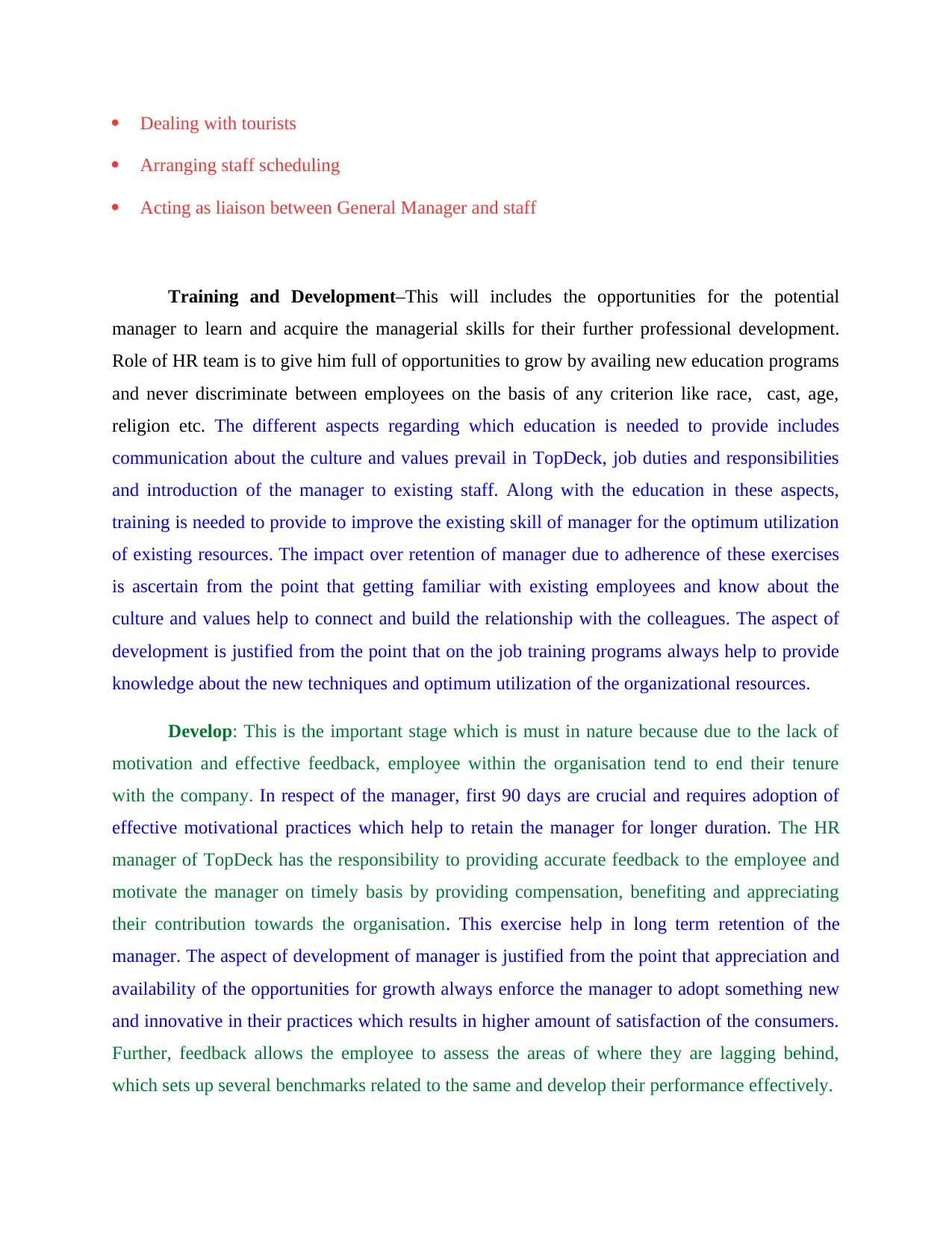
Dealing with tourists
Arranging staff scheduling
Acting as liaison between General Manager and staff
Training and Development–This will includes the opportunities for the potential
manager to learn and acquire the managerial skills for their further professional development.
Role of HR team is to give him full of opportunities to grow by availing new education programs
and never discriminate between employees on the basis of any criterion like race, cast, age,
religion etc. The different aspects regarding which education is needed to provide includes
communication about the culture and values prevail in TopDeck, job duties and responsibilities
and introduction of the manager to existing staff. Along with the education in these aspects,
training is needed to provide to improve the existing skill of manager for the optimum utilization
of existing resources. The impact over retention of manager due to adherence of these exercises
is ascertain from the point that getting familiar with existing employees and know about the
culture and values help to connect and build the relationship with the colleagues. The aspect of
development is justified from the point that on the job training programs always help to provide
knowledge about the new techniques and optimum utilization of the organizational resources.
Develop: This is the important stage which is must in nature because due to the lack of
motivation and effective feedback, employee within the organisation tend to end their tenure
with the company. In respect of the manager, first 90 days are crucial and requires adoption of
effective motivational practices which help to retain the manager for longer duration. The HR
manager of TopDeck has the responsibility to providing accurate feedback to the employee and
motivate the manager on timely basis by providing compensation, benefiting and appreciating
their contribution towards the organisation. This exercise help in long term retention of the
manager. The aspect of development of manager is justified from the point that appreciation and
availability of the opportunities for growth always enforce the manager to adopt something new
and innovative in their practices which results in higher amount of satisfaction of the consumers.
Further, feedback allows the employee to assess the areas of where they are lagging behind,
which sets up several benchmarks related to the same and develop their performance effectively.
Arranging staff scheduling
Acting as liaison between General Manager and staff
Training and Development–This will includes the opportunities for the potential
manager to learn and acquire the managerial skills for their further professional development.
Role of HR team is to give him full of opportunities to grow by availing new education programs
and never discriminate between employees on the basis of any criterion like race, cast, age,
religion etc. The different aspects regarding which education is needed to provide includes
communication about the culture and values prevail in TopDeck, job duties and responsibilities
and introduction of the manager to existing staff. Along with the education in these aspects,
training is needed to provide to improve the existing skill of manager for the optimum utilization
of existing resources. The impact over retention of manager due to adherence of these exercises
is ascertain from the point that getting familiar with existing employees and know about the
culture and values help to connect and build the relationship with the colleagues. The aspect of
development is justified from the point that on the job training programs always help to provide
knowledge about the new techniques and optimum utilization of the organizational resources.
Develop: This is the important stage which is must in nature because due to the lack of
motivation and effective feedback, employee within the organisation tend to end their tenure
with the company. In respect of the manager, first 90 days are crucial and requires adoption of
effective motivational practices which help to retain the manager for longer duration. The HR
manager of TopDeck has the responsibility to providing accurate feedback to the employee and
motivate the manager on timely basis by providing compensation, benefiting and appreciating
their contribution towards the organisation. This exercise help in long term retention of the
manager. The aspect of development of manager is justified from the point that appreciation and
availability of the opportunities for growth always enforce the manager to adopt something new
and innovative in their practices which results in higher amount of satisfaction of the consumers.
Further, feedback allows the employee to assess the areas of where they are lagging behind,
which sets up several benchmarks related to the same and develop their performance effectively.
⊘ This is a preview!⊘
Do you want full access?
Subscribe today to unlock all pages.

Trusted by 1+ million students worldwide
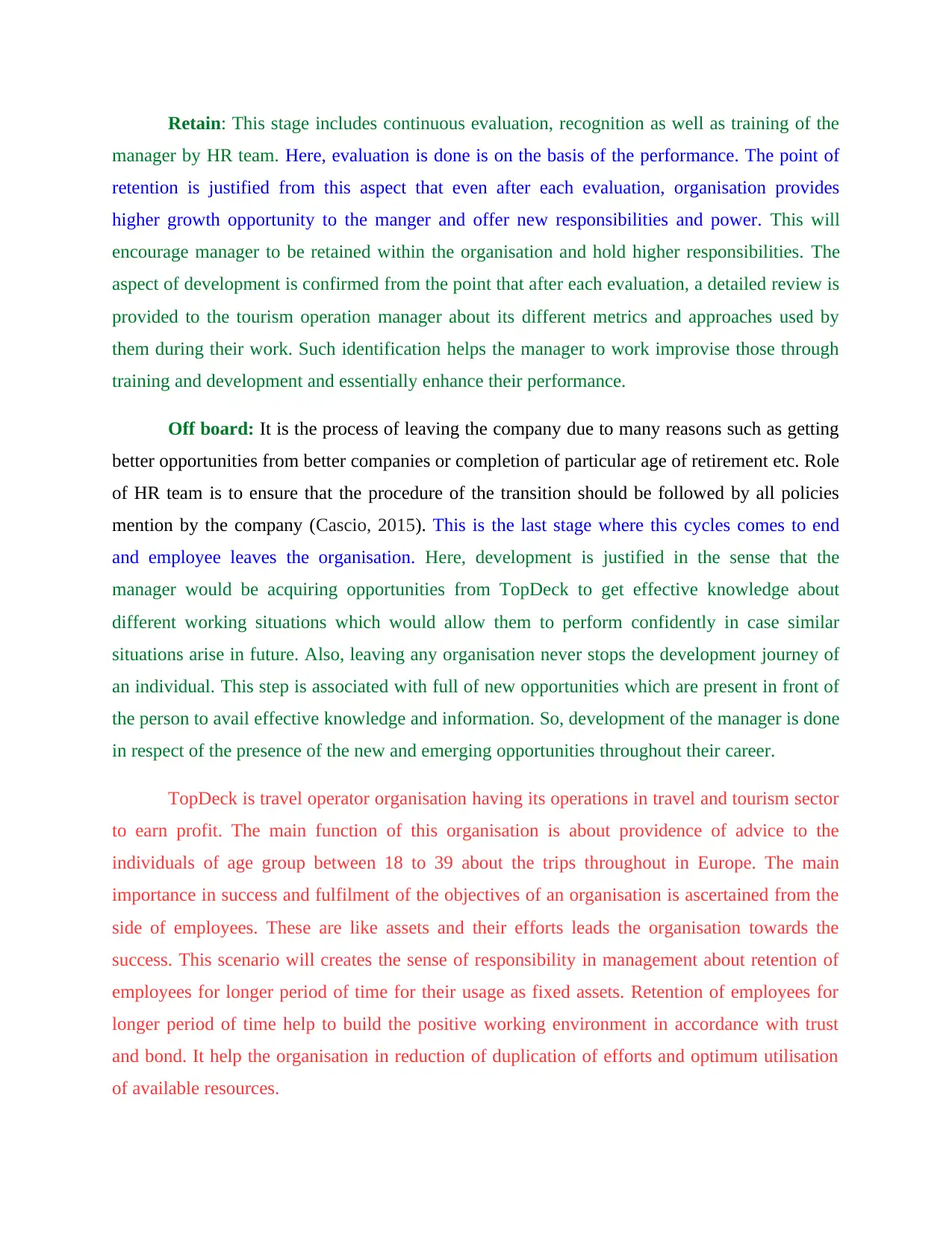
Retain: This stage includes continuous evaluation, recognition as well as training of the
manager by HR team. Here, evaluation is done is on the basis of the performance. The point of
retention is justified from this aspect that even after each evaluation, organisation provides
higher growth opportunity to the manger and offer new responsibilities and power. This will
encourage manager to be retained within the organisation and hold higher responsibilities. The
aspect of development is confirmed from the point that after each evaluation, a detailed review is
provided to the tourism operation manager about its different metrics and approaches used by
them during their work. Such identification helps the manager to work improvise those through
training and development and essentially enhance their performance.
Off board: It is the process of leaving the company due to many reasons such as getting
better opportunities from better companies or completion of particular age of retirement etc. Role
of HR team is to ensure that the procedure of the transition should be followed by all policies
mention by the company (Cascio, 2015). This is the last stage where this cycles comes to end
and employee leaves the organisation. Here, development is justified in the sense that the
manager would be acquiring opportunities from TopDeck to get effective knowledge about
different working situations which would allow them to perform confidently in case similar
situations arise in future. Also, leaving any organisation never stops the development journey of
an individual. This step is associated with full of new opportunities which are present in front of
the person to avail effective knowledge and information. So, development of the manager is done
in respect of the presence of the new and emerging opportunities throughout their career.
TopDeck is travel operator organisation having its operations in travel and tourism sector
to earn profit. The main function of this organisation is about providence of advice to the
individuals of age group between 18 to 39 about the trips throughout in Europe. The main
importance in success and fulfilment of the objectives of an organisation is ascertained from the
side of employees. These are like assets and their efforts leads the organisation towards the
success. This scenario will creates the sense of responsibility in management about retention of
employees for longer period of time for their usage as fixed assets. Retention of employees for
longer period of time help to build the positive working environment in accordance with trust
and bond. It help the organisation in reduction of duplication of efforts and optimum utilisation
of available resources.
manager by HR team. Here, evaluation is done is on the basis of the performance. The point of
retention is justified from this aspect that even after each evaluation, organisation provides
higher growth opportunity to the manger and offer new responsibilities and power. This will
encourage manager to be retained within the organisation and hold higher responsibilities. The
aspect of development is confirmed from the point that after each evaluation, a detailed review is
provided to the tourism operation manager about its different metrics and approaches used by
them during their work. Such identification helps the manager to work improvise those through
training and development and essentially enhance their performance.
Off board: It is the process of leaving the company due to many reasons such as getting
better opportunities from better companies or completion of particular age of retirement etc. Role
of HR team is to ensure that the procedure of the transition should be followed by all policies
mention by the company (Cascio, 2015). This is the last stage where this cycles comes to end
and employee leaves the organisation. Here, development is justified in the sense that the
manager would be acquiring opportunities from TopDeck to get effective knowledge about
different working situations which would allow them to perform confidently in case similar
situations arise in future. Also, leaving any organisation never stops the development journey of
an individual. This step is associated with full of new opportunities which are present in front of
the person to avail effective knowledge and information. So, development of the manager is done
in respect of the presence of the new and emerging opportunities throughout their career.
TopDeck is travel operator organisation having its operations in travel and tourism sector
to earn profit. The main function of this organisation is about providence of advice to the
individuals of age group between 18 to 39 about the trips throughout in Europe. The main
importance in success and fulfilment of the objectives of an organisation is ascertained from the
side of employees. These are like assets and their efforts leads the organisation towards the
success. This scenario will creates the sense of responsibility in management about retention of
employees for longer period of time for their usage as fixed assets. Retention of employees for
longer period of time help to build the positive working environment in accordance with trust
and bond. It help the organisation in reduction of duplication of efforts and optimum utilisation
of available resources.
Paraphrase This Document
Need a fresh take? Get an instant paraphrase of this document with our AI Paraphraser
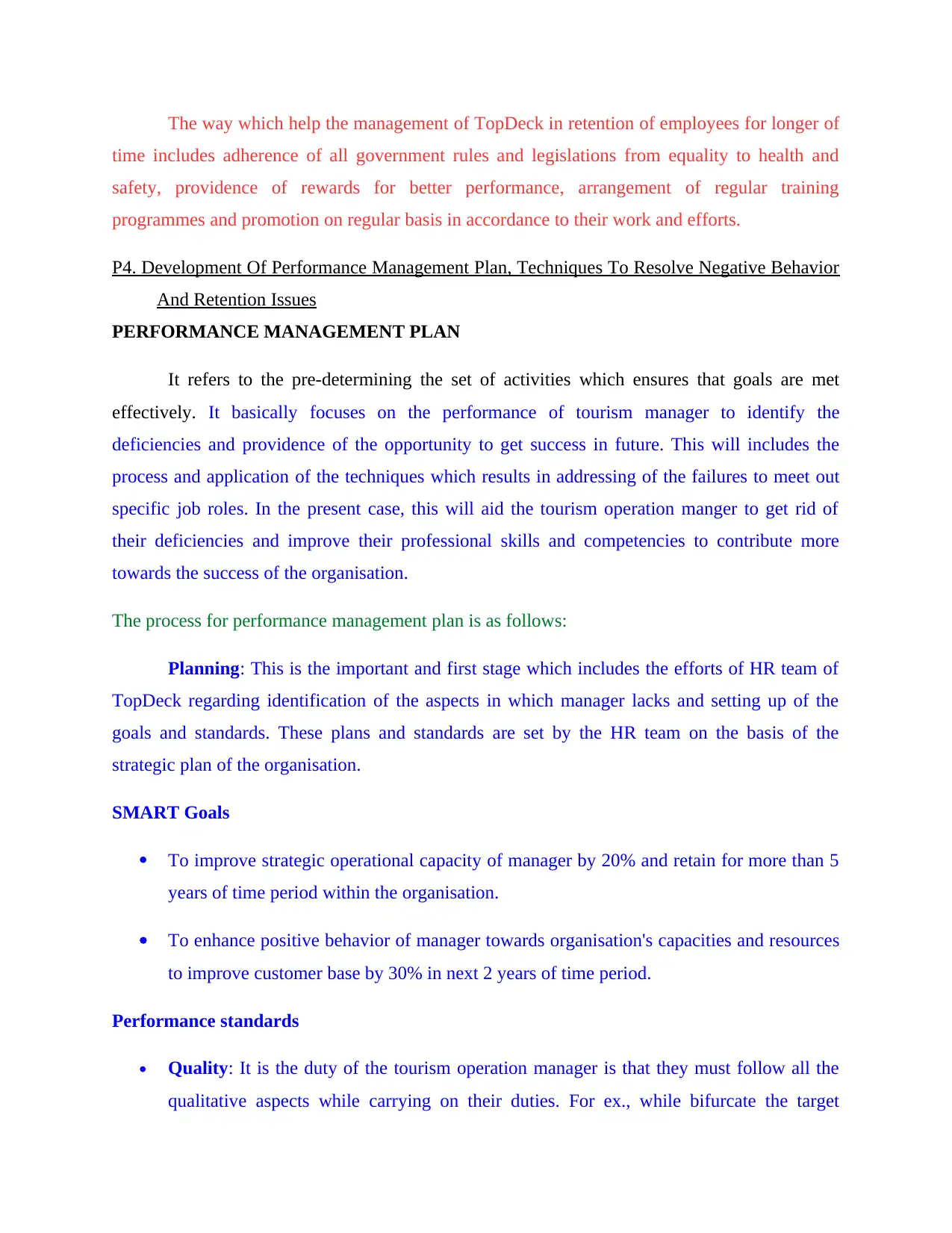
The way which help the management of TopDeck in retention of employees for longer of
time includes adherence of all government rules and legislations from equality to health and
safety, providence of rewards for better performance, arrangement of regular training
programmes and promotion on regular basis in accordance to their work and efforts.
P4. Development Of Performance Management Plan, Techniques To Resolve Negative Behavior
And Retention Issues
PERFORMANCE MANAGEMENT PLAN
It refers to the pre-determining the set of activities which ensures that goals are met
effectively. It basically focuses on the performance of tourism manager to identify the
deficiencies and providence of the opportunity to get success in future. This will includes the
process and application of the techniques which results in addressing of the failures to meet out
specific job roles. In the present case, this will aid the tourism operation manger to get rid of
their deficiencies and improve their professional skills and competencies to contribute more
towards the success of the organisation.
The process for performance management plan is as follows:
Planning: This is the important and first stage which includes the efforts of HR team of
TopDeck regarding identification of the aspects in which manager lacks and setting up of the
goals and standards. These plans and standards are set by the HR team on the basis of the
strategic plan of the organisation.
SMART Goals
To improve strategic operational capacity of manager by 20% and retain for more than 5
years of time period within the organisation.
To enhance positive behavior of manager towards organisation's capacities and resources
to improve customer base by 30% in next 2 years of time period.
Performance standards
Quality: It is the duty of the tourism operation manager is that they must follow all the
qualitative aspects while carrying on their duties. For ex., while bifurcate the target
time includes adherence of all government rules and legislations from equality to health and
safety, providence of rewards for better performance, arrangement of regular training
programmes and promotion on regular basis in accordance to their work and efforts.
P4. Development Of Performance Management Plan, Techniques To Resolve Negative Behavior
And Retention Issues
PERFORMANCE MANAGEMENT PLAN
It refers to the pre-determining the set of activities which ensures that goals are met
effectively. It basically focuses on the performance of tourism manager to identify the
deficiencies and providence of the opportunity to get success in future. This will includes the
process and application of the techniques which results in addressing of the failures to meet out
specific job roles. In the present case, this will aid the tourism operation manger to get rid of
their deficiencies and improve their professional skills and competencies to contribute more
towards the success of the organisation.
The process for performance management plan is as follows:
Planning: This is the important and first stage which includes the efforts of HR team of
TopDeck regarding identification of the aspects in which manager lacks and setting up of the
goals and standards. These plans and standards are set by the HR team on the basis of the
strategic plan of the organisation.
SMART Goals
To improve strategic operational capacity of manager by 20% and retain for more than 5
years of time period within the organisation.
To enhance positive behavior of manager towards organisation's capacities and resources
to improve customer base by 30% in next 2 years of time period.
Performance standards
Quality: It is the duty of the tourism operation manager is that they must follow all the
qualitative aspects while carrying on their duties. For ex., while bifurcate the target
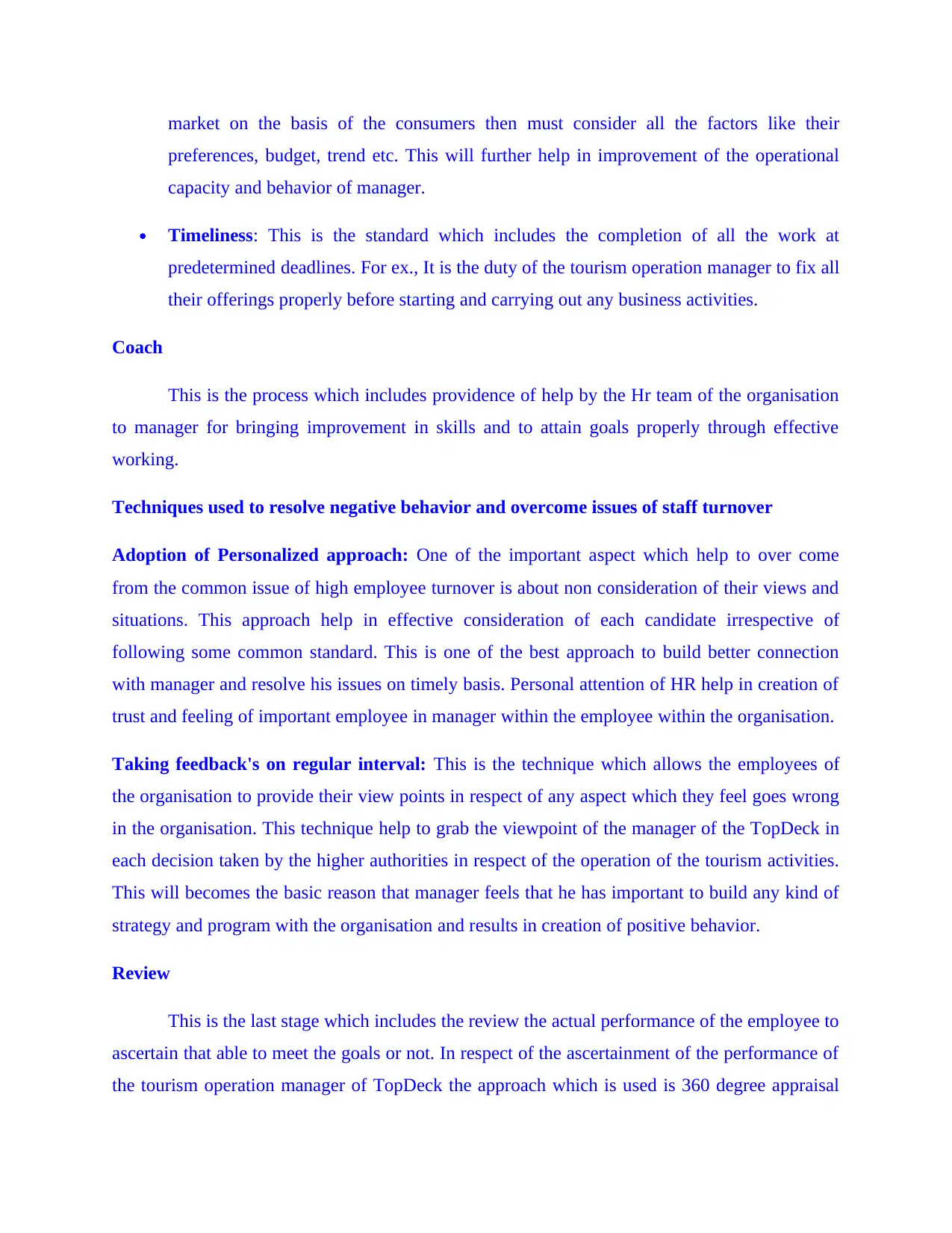
market on the basis of the consumers then must consider all the factors like their
preferences, budget, trend etc. This will further help in improvement of the operational
capacity and behavior of manager.
Timeliness: This is the standard which includes the completion of all the work at
predetermined deadlines. For ex., It is the duty of the tourism operation manager to fix all
their offerings properly before starting and carrying out any business activities.
Coach
This is the process which includes providence of help by the Hr team of the organisation
to manager for bringing improvement in skills and to attain goals properly through effective
working.
Techniques used to resolve negative behavior and overcome issues of staff turnover
Adoption of Personalized approach: One of the important aspect which help to over come
from the common issue of high employee turnover is about non consideration of their views and
situations. This approach help in effective consideration of each candidate irrespective of
following some common standard. This is one of the best approach to build better connection
with manager and resolve his issues on timely basis. Personal attention of HR help in creation of
trust and feeling of important employee in manager within the employee within the organisation.
Taking feedback's on regular interval: This is the technique which allows the employees of
the organisation to provide their view points in respect of any aspect which they feel goes wrong
in the organisation. This technique help to grab the viewpoint of the manager of the TopDeck in
each decision taken by the higher authorities in respect of the operation of the tourism activities.
This will becomes the basic reason that manager feels that he has important to build any kind of
strategy and program with the organisation and results in creation of positive behavior.
Review
This is the last stage which includes the review the actual performance of the employee to
ascertain that able to meet the goals or not. In respect of the ascertainment of the performance of
the tourism operation manager of TopDeck the approach which is used is 360 degree appraisal
preferences, budget, trend etc. This will further help in improvement of the operational
capacity and behavior of manager.
Timeliness: This is the standard which includes the completion of all the work at
predetermined deadlines. For ex., It is the duty of the tourism operation manager to fix all
their offerings properly before starting and carrying out any business activities.
Coach
This is the process which includes providence of help by the Hr team of the organisation
to manager for bringing improvement in skills and to attain goals properly through effective
working.
Techniques used to resolve negative behavior and overcome issues of staff turnover
Adoption of Personalized approach: One of the important aspect which help to over come
from the common issue of high employee turnover is about non consideration of their views and
situations. This approach help in effective consideration of each candidate irrespective of
following some common standard. This is one of the best approach to build better connection
with manager and resolve his issues on timely basis. Personal attention of HR help in creation of
trust and feeling of important employee in manager within the employee within the organisation.
Taking feedback's on regular interval: This is the technique which allows the employees of
the organisation to provide their view points in respect of any aspect which they feel goes wrong
in the organisation. This technique help to grab the viewpoint of the manager of the TopDeck in
each decision taken by the higher authorities in respect of the operation of the tourism activities.
This will becomes the basic reason that manager feels that he has important to build any kind of
strategy and program with the organisation and results in creation of positive behavior.
Review
This is the last stage which includes the review the actual performance of the employee to
ascertain that able to meet the goals or not. In respect of the ascertainment of the performance of
the tourism operation manager of TopDeck the approach which is used is 360 degree appraisal
⊘ This is a preview!⊘
Do you want full access?
Subscribe today to unlock all pages.

Trusted by 1+ million students worldwide
1 out of 22
Related Documents
Your All-in-One AI-Powered Toolkit for Academic Success.
+13062052269
info@desklib.com
Available 24*7 on WhatsApp / Email
![[object Object]](/_next/static/media/star-bottom.7253800d.svg)
Unlock your academic potential
Copyright © 2020–2026 A2Z Services. All Rights Reserved. Developed and managed by ZUCOL.




